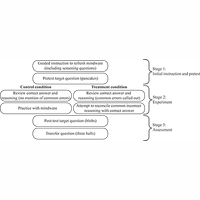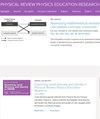Reinforcing mindware or supporting cognitive reflection: Testing two strategies for addressing a persistent learning challenge in the context of air resistance
IF 3.6
2区 教育学
Q1 EDUCATION & EDUCATIONAL RESEARCH
Physical Review Physics Education Research
Pub Date : 2024-09-16
DOI:10.1103/physrevphyseducres.20.020116
引用次数: 0
Abstract
In this study, we have explored the effectiveness of two instructional approaches in the context of the motion of objects falling at terminal speed in the presence of air resistance. We ground these instructional approaches in dual-process theories of reasoning, which assert that human cognition relies on two thinking processes. Dual-process theories suggest multiple possible avenues by which instruction might impact student reasoning. In this paper, we compare two possible instructional approaches: one designed to reinforce the normative approach (improving the outputs of the intuitive process) and another that guides students to reflect on and analyze their initial ideas (supporting the analytic process). The results suggest that for students who have already demonstrated a minimum level of requisite knowledge, instruction that supports analysis of their likely intuitive mental model leads to greater learning benefits in the short term than instruction that focuses solely on providing practice with the normative mindware. These results have implications for the design of instructional materials and help to demonstrate how dual-process theories can be leveraged to explain the success of existing research-based materials.

强化思维软件或支持认知反思:在空气阻力的背景下,测试应对持续性学习挑战的两种策略
在本研究中,我们探讨了在有空气阻力的情况下,物体以末端速度下落的运动背景下,两种教学方法的有效性。我们将这些教学方法建立在推理的双过程理论基础之上,该理论认为人类的认知依赖于两个思维过程。双过程理论提出了教学可能影响学生推理的多种途径。在本文中,我们比较了两种可能的教学方法:一种旨在强化规范方法(改善直觉过程的输出),另一种则引导学生反思和分析他们的初步想法(支持分析过程)。研究结果表明,对于已经掌握了最低限度的必要知识的学生来说,支持分析他们可能的直觉心智模式的教学在短期内会比只注重提供规范心智软件练习的教学带来更大的学习效益。这些结果对教学材料的设计具有重要意义,并有助于说明如何利用双过程理论来解释现有研究型材料的成功之处。
本文章由计算机程序翻译,如有差异,请以英文原文为准。
求助全文
约1分钟内获得全文
求助全文
来源期刊

Physical Review Physics Education Research
Social Sciences-Education
CiteScore
5.70
自引率
41.90%
发文量
84
审稿时长
32 weeks
期刊介绍:
PRPER covers all educational levels, from elementary through graduate education. All topics in experimental and theoretical physics education research are accepted, including, but not limited to:
Educational policy
Instructional strategies, and materials development
Research methodology
Epistemology, attitudes, and beliefs
Learning environment
Scientific reasoning and problem solving
Diversity and inclusion
Learning theory
Student participation
Faculty and teacher professional development
 求助内容:
求助内容: 应助结果提醒方式:
应助结果提醒方式:


